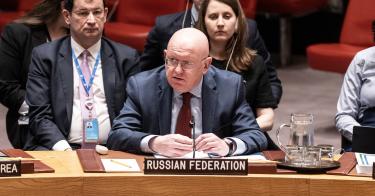For 14 years, a U.N. panel of experts documented evidence of North Korea’s nuclear violations and monitored U.N. member states’ enforcement of sanctions. Now, thanks to Russia’s veto of the annual reauthorization of that panel, this window into Pyongyang’s activity has been closed.
Russia’s action eliminates an important means to induce international action against North Korea’s repeated transgressions. In response, the U.S. must enforce its laws more diligently and lead an international coalition to comprehensively target Pyongyang and its accomplices.
Beginning in 2006, the U.N. Security Council passed 11 resolutions condemning North Korea for its nuclear and missile activity, and imposed sanctions for the regime’s violations of previous resolutions. These resolutions not only preclude any North Korean nuclear tests or ballistic missile launches, but require Pyongyang to abandon its weapons of mass destruction programs in a complete, verifiable and irreversible manner.
Moscow and Beijing allowed incrementally stronger resolutions after North Korea’s repeated nuclear and intercontinental ballistic missile tests, though rejecting stronger text and sanctions proposed by the United States and its allies. Russia and China would implement the new sanctions for a few months before again turning a blind eye to violations occurring on their soil or surrounding waters.
>>> Should the United States Recognize North Korea as a Nuclear Power?
The panel of experts was established in 2009 by U.N. Security Council Resolution 1874 as an investigatory body of eight experts that produced biannual reports with extensive data and photographs identifying violations by North Korea and other entities. The reports also highlighted shortcomings in enforcement of required sanctions and made recommendations that the U.N. or member states should undertake to improve the implementation of measures.
During the panel’s tenure, Russia and China habitually watered down or rejected evidence of North Korean violations to minimize punitive measures against Pyongyang. In recent years, Russia and China became more obstructionist on the U.N. Security Council and more blatantly shielded Pyongyang from any additional resolutions or sanctions.
Moscow and Beijing vetoed all proposals for additional resolutions and new sanctions after North Korea’s ICBM launches, including the likely multi-warhead Hwasong-17 and solid-fueled Hwasong-18. Russia and China have also proposed adding “sunset” clauses to allow existing sanctions against North Korea to expire if they are not unanimously renewed by the U.N. Security Council.
Russia’s invasion of Ukraine led to a resurgence of ties between Moscow and Pyongyang, which had largely languished after the collapse of the Soviet Union. In July 2022, North Korea supported the Russian invasion of Ukraine by diplomatically recognizing the “independence” of the Russian-backed separatist regions of Donetsk and Luhansk in eastern Ukraine.
North Korean leader Kim Jong Un’s September 2023 trip to Russia and summit meeting with Russian President Vladimir Putin was a breakthrough in bilateral relations and confirmed the growing military and diplomatic entente between the two countries.
During the past two years, North Korea provided an estimated 10,000 containers, with potentially over 2 million rounds of artillery ammunition, along with dozens of missiles to Russia, all in violation of U.N. resolutions. Moscow reportedly used the North Korean munitions and weapons in attacks in Ukraine.
It remains unknown what North Korea received in return for its military largesse to Russia. Moscow’s veto of the panel of experts may be part of a quid pro quo, in addition to financial and economic benefits. Last year, Kim visited several Russian military factories and bases, raising concerns that Moscow may provide high-tech military technology to Pyongyang.
>>> China–Russia–North Korea Solidarity Poses Risk to the U.S. and Its Allies
Disbanding the panel of experts makes it harder to monitor North Korea, but not impossible. The United States and its partners have extensive authorities under existing U.N. resolutions and international law to target violators. Regrettably, successive U.S. administrations have refrained from fully enforcing U.S. laws, particularly against Chinese banks and businesses aiding North Korea and committing money laundering crimes in the U.S. financial system.
The U.S. and South Korea recently announced the creation of the bilateral Enhanced Disruption Task Force to disrupt North Korea’s illicit financing of its nuclear and missile programs and importing of fuel supplies in excess of U.N.-mandated limits. The long-overdue effort hopefully signals an intent to more vigorously target entities supporting North Korea’s banned nuclear and missile programs.
With U.N. action hindered, the United States should take the lead in creating a coalition of likeminded nations to monitor compliance with U.N. resolutions and international law, and then target all entities violating those authorities.
In the past, U.S. officials privately met with foreign government, banking and business officials to provide evidence of violations occurring in those countries or entities. Such efforts should be renewed and expanded.
While the U.S. has the greatest intelligence resources as well as the most encompassing financial system, other nations will need to increase their efforts to coordinate and take punitive action against North Korea, including its growing cybercrimes, which the regime is increasingly using to evade sanctions and fund its military programs.
This piece originally appeared in Defense News



